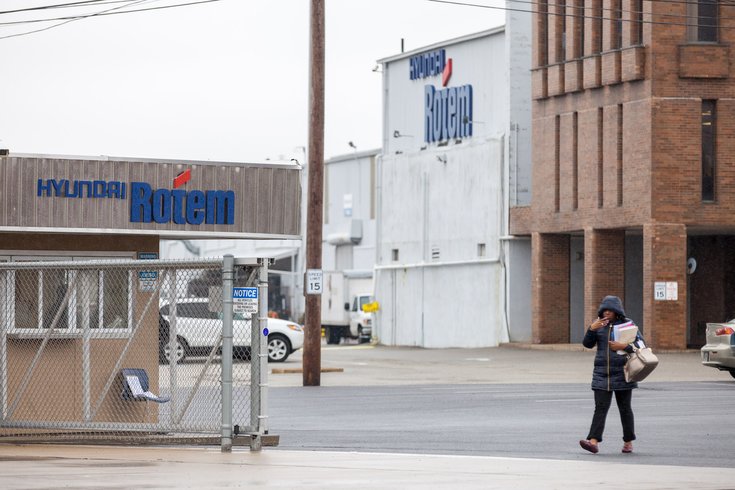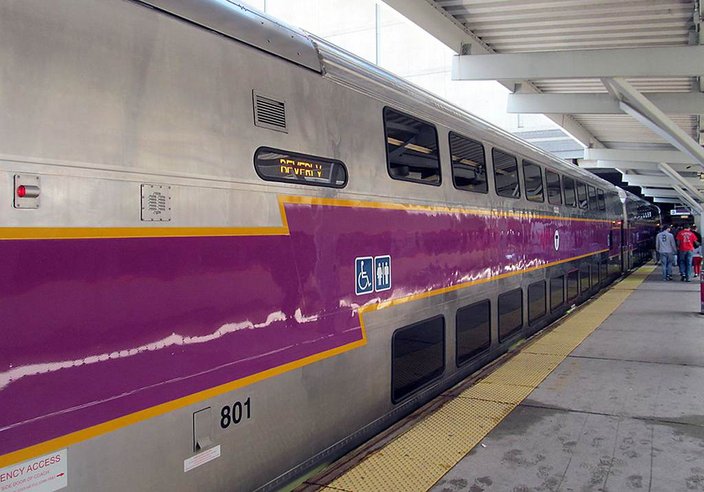
March 16, 2016
 Thom Carroll/PhillyVoice
Thom Carroll/PhillyVoice
The Hyundai Rotem plant, located at 2400 Weccacoe Avenue in South Philadelphia.
Despite urging from Philadelphia City Council, SEPTA has decided not to insert a local hiring preference into its procurement process for new bi-level Regional Rail cars.
Council unanimously requested that the transit agency implement the U.S. Department of Transportation's Local Hiring pilot program, which council claimed could provide a much-needed boost to the city's Hyundai Rotem manufacturing facility. But fearing contracting delays and diminished competition, SEPTA refrained from adjusting its bidding process.
Doing so would "unduly limit competition" and bring a "certainty of procurement delays," SEPTA Board Chairman Pasquale T. Deon Sr. wrote in a letter sent last week to council. Therefore, SEPTA chose to continue its "well-established and federally approved process" that awards the contract to the lowest responsible bidder.
SEPTA issued a Request For Proposal last August to build 45 bi-level rail cars. After several extensions, bids are now due April 5. At least three manufacturers, including Hyundai Rotem, have expressed interest.
"The rule is the lowest responsible bidder," SEPTA spokesman Andrew Busch said. "We review the bids. It's not always the lowest price, but in a lot of cases that is what it ends up being. We have to make sure they have the ability to fulfill the order."
Yet, council and Transit Workers Union Local 234 fear Hyundai Rotem could close its South Philadelphia manufacturing facility if work does not pick up. Winning the bid for the bi-level cars, expected to cost about $191 million in total, could go a long way, Councilman David Oh said.
"They're a big source of opportunity and a good experience in Philadelphia helps to bring in other companies and investors," said Oh, among the most outspoken council members on the issue. "A bad experience in Philadelphia helps to deter opportunities that our city so badly needs."
The facility – less than 10 years old – employed about 350 workers earning an average salary of $56,000 at the height of its production, Oh said. But it now employs less than 100 workers.
Oh and Local 234 Treasurer Joe Coccio fear that the China Railway Rolling Stock Corporation, a state-owned Chinese train manufacturer making headway in the United States, could perennially underbid Hyundai Rotem for contracts.
"Everybody is talking about jobs in China," Coccio said. "Yet, right here in Philadelphia, nobody has enough sense to put in a local hiring preference."
C.R.R.C., a merger of two Chinese companies, broke ground last September on a $60 million plant in Springfield, Mass., part of a $566 million contract it won to provide 284 subway cars for Boston's transit system. Last week, the company won its second American contract, a $1.3 billion bid to build rail cars for Chicago's transit system.
"It's easy to bid low when you have no experience," Oh said. "Who is to say that they're going to be able to meet their times? A new relationship often does have kinks and things that need to be worked out (with) a company that is doing business overseas and is now entering the U.S. market."
A bi-level coach built by Hyundai-Rotem for the Massachusetts Bay Transportation Authority. The company is a potential bidder to build similar railcars for SEPTA.
That's what Hyundai Rotem, based in South Korea, did when it opened its Philadelphia facility, the headquarters of the company's USA division.
Hyundai Rotem invested $27 million to build the Philadelphia manufacturing plant after it won a $274 million contract to assemble 120 Silverliner V cars for SEPTA in 2006. But a variety of material shortages, design flaws and labor issues delayed completion of the delivery for years. Hyundai Rotem paid SEPTA $13 million in late penalties.
"Some of it is their fault," Oh said of the Silverliner V experience. "Some of it is our fault. At the end of the day, I think some of it is what happens when you begin a new relationship with a manufacturer."
In a letter sent to Deon in January, council requested SEPTA re-issue the RFP with "local hiring goals," saying it would be a "missed opportunity" to award the contract to a company outside of Philadelphia. That followed a resolution, passed unanimously in June, that included the same recommendation.
Deon responded in his own letter, dated March 10, by acknowledging the Pilot Program has since expired and noting that the American Public Transportation Association had warned it could result in net job losses and increased prices on a fragile market. (The year-long Local Hiring pilot program debuted March 3, 2015.)
Deon also noted that SEPTA awarded a $6.3 million contract to Hyundai Rotem last month to refurbish 11 Bombardier Regional Rail cars, an extension of a pre-existing agreement with Hyundai Rotem to rehab 22 cars.
"Because there are so few transit rolling stock manufacturers with a presence in the United States," Deon wrote, "SEPTA is careful to structure its rolling stock procurements in a way that maximizes the number of bids, and encourages competitive pricing."
Only three firms have expressed interest in the RFP, a factor Deon said highlights "how narrow the field of competition is for railcar procurements."
Hyundai Rotem spokesman Andy Hyer praised SEPTA's support for prior projects. He said the company supports adding a local hiring preference because it maintains a competitive bid process while also potentially aiding local sub-suppliers.
"SEPTA has been very supportive to Hyundai Rotem and the projects we've worked on with them," Hyer said. "This resolution is just another way that they could be further supportive."
The bi-level coaches will be added to SEPTA's existing Regional Rail fleet of 392 cars. Passenger capacity could range between 120 to 170 passengers per car, Busch said. By comparison, the Silverliner V cars hold 105 passengers.
"That's going to help us get toward meeting this ridership demand," Busch said. "All indications are it's just going to continue to grow. We're keeping up with the demand we're seeing."
The bi-level cars, anticipated to improve efficiency, likely will be added to SEPTA's longer Regional Rail lines, including the Paoli-Thorndale and Lansdale-Doylestown lines, Busch said.
The RFP includes an option for SEPTA to purchase as many as 10 additional cars.
 Credit/Pi.1415926535 via Wikipedia
Credit/Pi.1415926535 via Wikipedia